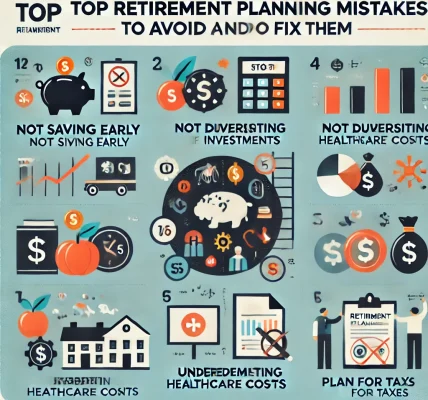Introduction
Retirement planning is a crucial part of financial stability, yet many people make common mistakes that can jeopardize their future. Whether you are just starting to save or approaching retirement, avoiding these pitfalls can help ensure a comfortable and secure post-retirement life.
In this blog, we will discuss the most common retirement planning mistakes, their consequences, and strategies to avoid them. By learning from these missteps, you can optimize your retirement savings and make well-informed financial decisions.
1. Delaying Retirement Savings
Why It’s a Mistake
Many people believe they can start saving later when they have a higher income. However, delaying retirement savings reduces the power of compound interest and increases financial stress in later years.
The Consequences
- You may need to save a larger portion of your income later in life.
- Reduced time for investment growth.
- Higher reliance on social security or pensions.
How to Avoid It
- Start saving as early as possible, even if it’s a small amount.
- Take advantage of employer-sponsored retirement plans like 401(k).
- Set up automatic contributions to a retirement account.
2. Not Taking Advantage of Employer Match Programs
Why It’s a Mistake
Many employers offer a 401(k) match—essentially free money for your retirement. Not contributing enough to receive the full match is like leaving money on the table.
The Consequences
- Missed opportunity to increase retirement savings.
- Reduced overall investment returns.
How to Avoid It
- Contribute at least the minimum amount required to receive the full employer match.
- If possible, increase contributions gradually over time.
3. Relying Too Much on Social Security
Why It’s a Mistake
Social Security benefits are meant to supplement retirement income, not fully replace it. Relying solely on Social Security can result in financial hardship.
The Consequences
- Insufficient funds to maintain your desired lifestyle.
- Increased financial stress in case of unexpected expenses.
How to Avoid It
- Diversify your retirement income sources (401(k), IRA, investments, savings).
- Plan for at least 70-80% of your pre-retirement income.
- Delay claiming Social Security benefits if possible to increase payouts.
4. Underestimating Healthcare Costs
Why It’s a Mistake
Many retirees fail to account for rising healthcare expenses, including insurance, medications, and long-term care.
The Consequences
- Financial strain due to unexpected medical expenses.
- Higher dependency on family or government aid.
How to Avoid It
- Consider Health Savings Accounts (HSA) for tax-advantaged medical savings.
- Invest in long-term care insurance.
- Budget for increased healthcare costs in retirement.
5. Not Diversifying Investments
Why It’s a Mistake
Some retirees invest too conservatively, missing out on growth opportunities, while others take excessive risks late in life.
The Consequences
- Low investment returns may not keep up with inflation.
- High-risk investments could result in significant losses.
How to Avoid It
- Maintain a balanced investment portfolio based on your risk tolerance and retirement timeline.
- Rebalance your portfolio periodically to adapt to changing financial needs.
- Consult a financial advisor for professional guidance.
6. Failing to Adjust for Inflation
Why It’s a Mistake
Inflation erodes purchasing power over time, meaning the same amount of money will buy less in the future.
The Consequences
- Your retirement savings may not last as long as expected.
- Reduced financial security in later years.
How to Avoid It
- Invest in assets that historically outpace inflation (e.g., stocks, real estate).
- Consider annuities with inflation adjustments.
- Plan for a higher withdrawal rate in later years.
7. Withdrawing Too Much Too Soon
Why It’s a Mistake
Many retirees withdraw large amounts early in retirement, depleting their savings faster than anticipated.
The Consequences
- Risk of outliving retirement funds.
- Increased financial dependence on family or government aid.
How to Avoid It
- Follow the 4% rule (withdraw no more than 4% annually from retirement savings).
- Budget carefully and adjust spending based on market conditions.
- Consider annuities or passive income sources for stable cash flow.
8. Not Planning for Taxes in Retirement
Why It’s a Mistake
Many retirees fail to consider how taxes will impact their withdrawals from retirement accounts.
The Consequences
- Higher-than-expected tax liabilities.
- Reduced retirement income.
How to Avoid It
- Diversify between pre-tax (401(k), Traditional IRA) and after-tax accounts (Roth IRA).
- Strategically withdraw funds to minimize tax burdens.
- Consult a tax professional for personalized tax planning strategies.
9. Carrying Too Much Debt into Retirement
Why It’s a Mistake
Retiring with significant debt (mortgage, credit cards, loans) can limit financial freedom.
The Consequences
- Increased financial stress and reduced disposable income.
- Higher reliance on savings to cover debt payments.
How to Avoid It
- Pay off high-interest debts before retirement.
- Avoid unnecessary new loans close to retirement.
- Create a budget to manage expenses efficiently.
10. Not Having an Estate Plan
Why It’s a Mistake
Without an estate plan, your assets may not be distributed according to your wishes, and your loved ones may face legal complications.
The Consequences
- Family disputes over inheritance.
- Higher estate taxes and legal fees.
How to Avoid It
- Create a will and designate beneficiaries.
- Set up a trust if needed to manage wealth transfer.
- Keep estate plans updated based on changes in family and financial situations.
Conclusion
Retirement planning mistakes can have long-lasting consequences, but they are avoidable with the right strategies and financial discipline.
✅ Start saving early to maximize compound interest. ✅ Take advantage of employer-sponsored plans and tax benefits. ✅ Plan for healthcare costs and inflation to maintain financial security. ✅ Diversify investments and withdraw funds wisely. ✅ Minimize debt and optimize tax strategies to preserve wealth. ✅ Have an estate plan to ensure your loved ones are taken care of.
By being proactive and avoiding these common pitfalls, you can achieve financial freedom and enjoy a stress-free retirement. Start planning today!




